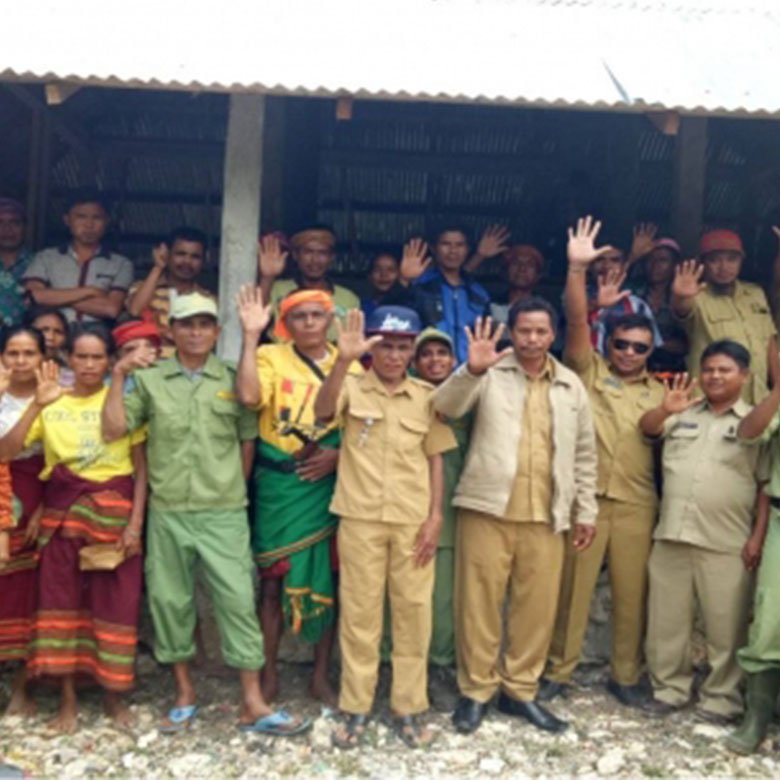


Post-Monitoring Assistance for CLTS in Southwest Sumba
February 14, 2022ACTIVE ROLE OF HEALTH WORKERS
The achievement of changes in the community in the form of health initiatives identified by the community itself to tackle infectious diseases as well as social support for pregnant women, nursing mothers and toddlers, cannot be separated from the active role of health workers, both in the village, Pustu, Puskesmas, Hospital and Health Office. For example, in emergency cases reported by the community, there was a good response from the puskesmas and the Health Office. In the Alor region, there was a case of a mother who gave birth at a traditional healer with the placenta left in the stomach.
Village’s Health Cadre or Tim Kesehatan Desa (TKD) then contacted the Health Office’s 2H2 call center. The mother was then picked up and immediately referred to the hospital so that she could be treated and survived. Likewise, the case of a high-risk pregnant woman (malaria) with a breech baby in Mataru Utara Village in Alor who was referred to the Regional Hospital, was successfully helped so that the mother and baby survived.
Some other examples of good response from health workers, making the community in Alor Barat Daya-Alor sub-district began to change from giving birth at home to at health facilities. The community as well as health workers have utilized health services for pregnancy check-ups and childbirth. The head of the Pustu in Pintumas also responded to the agreement and decision of the local village government requiring delivery at health facilities by cleaning the waiting room for families waiting for delivery at the Pustu and preparing a duty officer.
Currently, there have been 8 deliveries at the Pustu from none previously. Likewise at Puskesmas Probur, after there was a community agreement in Probur village that required delivery at health facilities, health workers (midwife coordinators) committed to assisting deliveries at the Puskesmas. While in Mataru-Alor sub-district, initially pregnancy examinations according to standards were almost non-existent and childbirth was still carried out at home and assisted by village healers, and there were even mothers who delivered themselves. After an agreement between health workers and the community, currently health services provided by health workers have begun to intensify, pregnant women have begun to check their pregnancies and childbirth is already in the village health facility Taman Mataru.


When the community in Maktihan village suggested a blood type test, the West Malacca Health Center responded well. This activity was held on November 12, 2016 at the local village office. There were 103 people (66 women and 37 men) who had their blood group checked and became a ‘blood bank’ in case a birth mother needed it in an emergency situation.
Puskesmas in Wileman and West Malacca play an active role in screening TB suspects by providing sputum pots, laboratory tests, providing anti-TB drugs, monitoring and evaluating treatment. In malaria testing, staff provide tools and reagents as well as drugs. The Puskesmas also provides an ambulance to help transport pregnant women who are about to give birth, conduct HB checks, administer vaccines and socialize individually about preparation for childbirth. For postpartum women, the Puskesmas conducts monitoring and after the 40th day, motivates couples to join the family planning program.
Likewise in the East Sumba region, Puskesmas Pandawai responded to community proposals in Palakahembi and Watumbaka villages to facilitate socialization and screening of TB suspects. Then to streamline the handling of TB in the Nggoa sub- district area, the East Sumba District Health Office has responded to the recommendations of stakeholder meeting participants at the sub-district level by placing a laboratory specialist at the Nggoa Community Health Center to be able to conduct suspected sputum examination. This position was previously held by the Head of the Puskesmas.
Although not all went smoothly, it is hoped that this good response will be maintained and developed in the future. Thus, the enthusiasm of health cadres and the community who are enthusiastic about being actively involved in supporting community health services is not unrequited but continues to be maintained.*

